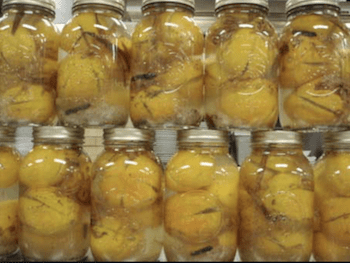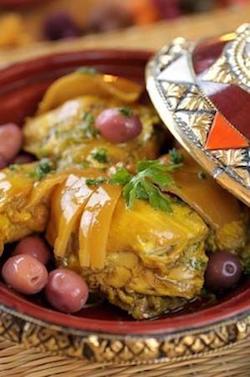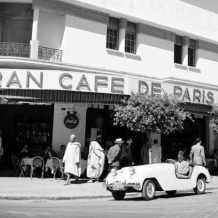How to Make Moroccan Preserved Lemons, A Step by Step Guide for Beginners
Preserved lemons, also referred to as pickled lemons, are an indispensable ingredient in Moroccan cuisine. They can be found in various Moroccan recipes. The preserved lemon is a condiment that is popular in South Asia and North Africa, and partiruclarly widely used in Morocco. Also referered to as a country lemon, home grown, or beldi, preserved lemons are pungent in taste. Many claim preserved lemons hold medicinal value in Moroccan culture. It is also thought that preserved lemons are a condiment that can be eaten to vastly improve gut flora.
Moroccan preserved lemons are served in dishes that travelers can discover in Moroccan restaurants and private homes. They are used in slow cooked tagines, stews, and soups. Preserved lemons add a zesty, tangy twist to recipes and boost the flavor of many Moroccan dishes.
In each of Morocco’s Imperial Cities, there is a Jewish neighborhood referred to as “the mellah” (Arabic translation – salt) and it is here along with the souks and local marketplaces where you can find preserved lemons being sold. For travelers visiting Morocco who are foodies and would like to learn about preserved lemons first hand, A Taste of Morocco Cuisine Tour offers the opportunity to tour Morocco’s souks and markets where preserved lemons are made and sold.

Ask a Moroccan about the role preserved lemons had in their kitchen and they will likely share their childhood memories of watching their mothers salt kilos of whole lemons; then packing them into a large glass mason jars and storing them in cupboards up to 2 months.
One of the most common Moroccan recipes with preserved lemon is the famous preserved lemon chicken tagine. Some other contemporary dishes that use preserved lemons are couscous and pomegranate salad, lemon pickled fruits and newly, home made gastronomic ice cream desserts.
Tasty Moroccan Lemons
Doqq and Boussera are two of the most popular varieties of lemons that Moroccans use for their pickled lemons. In the United States, the closest variety comparing to these would be the small Myers lemons as similar to the Moroccan lemons, they are thin skinned, fragrant, and a have a nice texture.
Preserved lemons also referred to as pickled lemons can be found in Morocco’s major supermarkets and also at local food stalls and souks. Pickled lemon varieties are also commonly made with cinnamon, bay and thyme.
The basic preserved lemon recipe is not difficult to make in your home. Making preserved lemons is healthier than purchasing them as it allows you to hand pick the ingredients. The preserved lemon enhances the flavor of Moroccan dishes as it is used when cooking meats, salads, stews and sauces.
How To Make Preserved Lemons
In under half an hour, you can prepare a whole jar of preserved lemons. There is little maintenance to follow. After about a month you can enjoy pickled lemons as a palette cleanser, salad topping, as a side to grains, or marinade for fish, lamb, chicken, shrimp, or as a veggie dip with greek yogurt to spread on sandwiches.

Below are our ingredients, tips, and steps to make the most delicious preserved pickled lemons.
Ingredients:
- Use lemons that have been sitting at room temperature, they will release more juice.
- Use enough lemons to fit into your mason jar.
- Use Kosher salt, or sea salt.
Steps:
- The first step is to sterilize your jar. Clean it with soap and hot water (don’t dry), then put it in the oven for 30 minutes at 350 degrees. If you don’t have an oven and your jar is heat protected, you can immerse it into hot boiling water on the stovetop.
- Your Lemon: Make a vertical cut, halfway through the lemon. The two halves should remain attached at the base, cut the lemon in half. Turn the lemon upside and cut the lemon again vertically to the last cut, you will end up with pieces attached in the middle.
- Add a teaspoon of salt to each side of the lemon.
- When the lemons are salted and the jar is sterilized, stuff them inside the jar. Next, sprinkle some salt in the jar. If you are using a jar make sure you have enough lemons to fill the jar.
- Cover the jar and keep it at room temperature in a dark cabinet. The only time you are going to check on the jar is after the first 3 days to make sure the top lemons are covered with juice. If they are not covered then use lemon juice to cover and return to the dark closet.
- Before using the lemons, wash them with water to reduce the amount of salt.
- If using them in a tagine, cook it with the skin as it makes the dish more flavorful, then discard the pulp. If using them in salad, you can dice in a salad and use both pulp and skin.
Salting Your Pickles
An ideal salt for pickling is unrefined, whole, full of natural vitamins, minerals and does not contain additives or iodine; iodine inhibits the growth of beneficial bacteria in the pickled lemons. Kosher salt, with its larger flakes is great for breaking down the lemon rinds. Fine grain salt will also yield good results.
In Morocco, top quality bio salt can be found in the Ourika Valley, Smimou and the Atlas mountains Tinerhir province’s three villages Ait-Daoud, Ait-Lahcen and Toumiline which have all been part of the country’s salt mining history since the end of the 18th century.
In larger Moroccan cities the best salts are sold at local weekly souks and smaller bio shops. In Marrakech, Bio Shop Ayaso and in Casablanca, Green Village stock a variety of types of salts.
Add Spices to Preserved Lemons
Most people just use salt and lemons in the lemon pickling process, however, if you have made several batches of preserved lemons and feel like an expert, you can experiment with different spice combinations. Other possible ingredient to add into the pickled lemon combing process are cinnamon sticks, bay leaves, thyme, basil, oregano, cumin, rosemary, garlic, sliced ginger, and anything else you can imagine. Let these ingredients marinate with your lemons for up to one year to enjoy the most nutrient dense and fragrant results. The spice markets Morocco are typically well stocked with ingredients for your pickled lemons.
FAQ: Preserved Lemons
How long do preserved lemons keep? If preserved lemons are kept refrigerated, they will keep for a year and you can take your time to use them. Also, do your best to leave the pulp and seeds attached to the lemon as it will keep them more nutrient dense and thus they will last longer.
Do preserved lemons need to be refrigerated? To make them last longer, it is best to refrigerate lemons and seal in an airtight container.
How to store preserved lemons? You can store them on the counter however or high above your kitchen cabinets.





